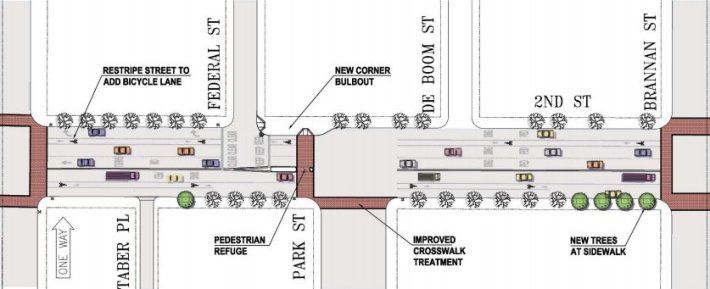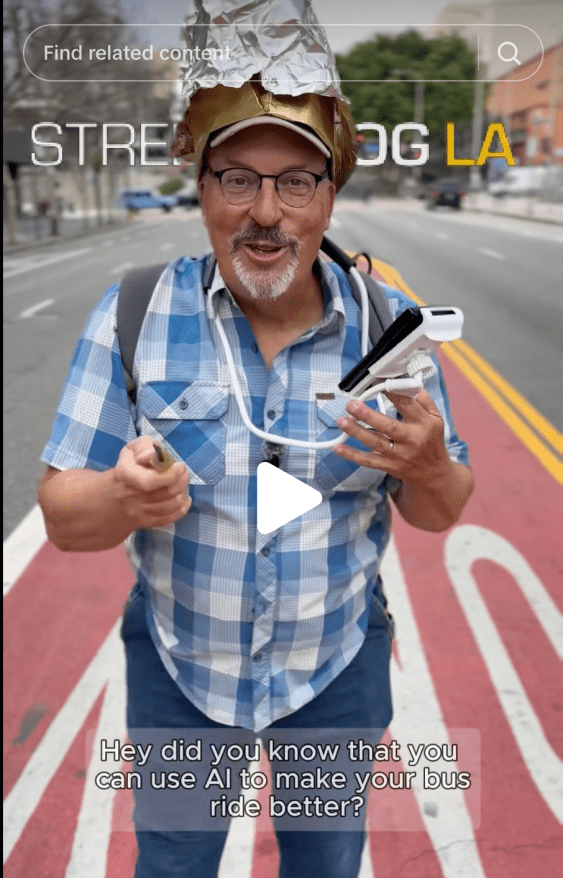A plan for streetscape improvements on Second Street has faltered after the city agencies overseeing it neglected to implement them before dedicated funds expired.
The project that won't receive the funds is a package including bike lanes, pedestrian safety improvements, and road repaving on Second Street between Market and King Streets.
The San Francisco Board of Supervisors, acting as the SF County Transportation Authority (SFCTA) Board, approved a measure today redistributing the expiring $4.8 million in federal funds to three other projects in order to avoid forfeiting them.
The Department of Public Works (DPW) and the SFMTA "failed to steer the project toward successful implementation," states a memo from DPW Director Mohammed Nuru and SFMTA Director of Transportation Ed Reiskin to Jane Kim, supervisor of District 6, which includes Second Street. "While we are deeply disappointed that the project has stalled at this juncture, we want to assure you that both DPW and SFMTA are dedicated to implementing this project in the near future."
The SFCTA, which oversees transportation financing in San Francisco, approved the funds in 2010 from a federal Congestion Management Agency Block Grant. That grant was awarded on the condition that it be spent by February 1, 2012.
But in what the SFCTA called a "surprise," the SFMTA and DPW failed to meet that deadline after a series of communication breakdowns between the agencies. The SFCTA board called today's special last-minute hearing to vote on a new plan to divert the funds.
According to an SFCTA document [PDF], $3.4 million of the diverted funds will go to the Cesar Chavez Streetscape Improvement Project, $948,200 to the Two-Way Haight Street Project, and $529,815 to add overhead SFGo signs on Second Street -- a program aimed at facilitating wayfinding for drivers which has faced criticism for making city streets look more like freeways.
The memo details a long sequence of bureaucratic tangles, including the agencies' failure to finish revising plans for the bike lanes on Second in response to public feedback. The bike lanes are one of 11 SF Bike Plan projects not initially greenlighted by the SFMTA Board of Directors. The SFMTA's project revisions stalled in 2009, and DPW's project manager was not aware the bike lanes have not been legislated.
Biking and walking advocates said that regardless of the merit of the projects now receiving the funding, the redistribution sets a dangerous precedent for protecting dedicated funds.
"While it's a relief that city leaders are committing to advance critical pedestrian and bicycle safety improvements on Second Street, we are still deeply concerned that nearly $5 million could almost fall through the cracks," said Leah Shahum, executive director of the San Francisco Bicycle Coalition. "This should be an urgent wake-up call that city leaders must do a better job of prioritizing pedestrian and bicycle projects and working together for safer streets. As someone who worked hard to pass the [Proposition B] streets bond last fall, I worry about the city's readiness to deliver on tens of millions of dollars of pedestrian and bicycle projects that people are clamoring for."
Staffers from the three agencies said they were working on a new plan to fund the Second Street project, which may now cost as much as $8 million, "depend[ing] on the desired level of bike improvements that come out of the planning phase," according to the memo. Potential funding sources include the Prop B street improvements bond, Proposition AA (a local vehicle license fee), and the federal One Bay Area Grant. Staff said they are continuing the public outreach process, and the new timeline sets project completion at no sooner than 2015.
"This isn't about picking one project over the other," said Manish Champsee, policy chair of Walk SF's Board of Directors. "However, I do think there is a contract, if you will, between public agencies and the public, that when the public is promised something such as pedestrian safety and walkability improvements, that those improvements do get made."





